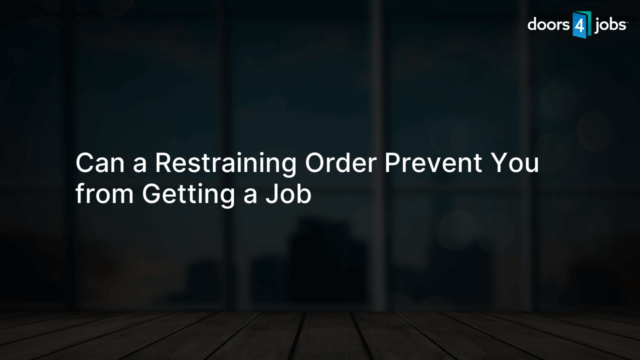Yes, you can get a job with an outstanding warrant, but it could be challenging due to background checks and potential legal consequences. It is advisable to consult with an attorney and address the warrant before pursuing employment.
Navigating Job Applications with a Warrant
Finding a job while having an outstanding warrant might feel daunting, but it is not impossible. However, applicants should be aware of potential obstacles they may face throughout the process.
Background Checks and Legal Implications
Employers often conduct background checks on potential employees. An outstanding warrant may cause complications during the hiring process. Legally, employers cannot refuse to hire someone solely based on an active warrant, but they can choose not to move forward if a warranted arrest could impact the candidate’s ability to perform the job.
Addressing the Warrant
It is advisable to handle an outstanding warrant before applying for a job. Consulting with a legal professional is highly recommended; they will guide individuals through the process of resolving the warrant. Usually, this involves appearing before a judge and addressing the issue at hand, which might include paying a fine or attending a mandated class.
Disclosing the Warrant to Prospective Employers
Honesty is essential during the application process. If a potential employer asks specifically about warrants or legal issues, candidates should be forthcoming with this information. Transparency can help build trust between the candidate and employer, showcasing the applicant’s willingness to rectify the situation and eagerness to move forward professionally.
Finding the Right Job
While navigating the job market with a warrant, applicants should look for opportunities that align with their skills and are less likely to be impacted by legal complications. Self-employment options or freelance work may also be suitable for those unsure about how their warrant may affect potential employment.
Lean on Networking and Personal Connections
Personal connections and networking can make a significant difference in securing a job with an outstanding warrant. Those with a strong professional network may find more opportunities, as networking can bypass some of the obstacles getting employed might present. Nurturing pre-existing connections can sometimes lead to referral-based job leads.
Handling Job Interviews with a Warrant
During the job interview process, it’s important to be well-prepared for any potential questions related to the outstanding warrant. Focus primarily on showcasing professional skills and experience that make the candidate a great fit for the position. If a discussion about the warrant arises, address it with honesty and explain the steps being taken to resolve it.
Remaining Compliant During Employment
Once employed, it’s crucial to be proactive in handling the outstanding warrant to avoid disruptions to the new job. Some companies may have policies requiring employees to inform them of any changes in legal circumstances. Familiarize oneself with company policies to ensure compliance and maintain a positive relationship with the employer.
Staying Informed: Legal Rights and Protections
Having a warrant does not leave job seekers without rights. Remaining informed about relevant state and federal employment laws can be crucial in gaining employment despite having an outstanding warrant. Additionally, familiarize oneself with the Americans with Disabilities Act (ADA), as it may offer support in certain situations that involve a warrant related to mental health or drug addiction.
Seeking Support from Professionals
Throughout the job search, it may be valuable to consult with legal professionals, career coaches, or counselors to provide guidance on finding suitable employment opportunities. These professionals can help navigate the job market and offer tailored advice for unique situations, increasing the likelihood of successful job applications.
Considering Job Skills Programs and Opportunities
While working to resolve an outstanding warrant, consider pursuing job training or placement programs that can build skills and increase employability. Many local and state government agencies, as well as nonprofit organizations, offer resources and support for individuals facing challenges during their job searches.
FAQs about Getting a Job with a Warrant
If you’re navigating the job search process with an outstanding warrant, you may have certain questions that require answers to make informed decisions. Here are some common questions and their responses.
Will an outstanding warrant always appear on a background check?
Not all outstanding warrants will appear on a background check; this depends on factors like the type, jurisdiction, and how thoroughly the warrant was entered into the database. However, it’s best to assume that a warrant may be discovered and to take necessary precautions before applying for jobs.
Can an employer fire me for having a warrant?
An employer cannot fire someone solely for having an outstanding warrant. However, they might be able to terminate employment if the warrant significantly impacts the job, attendance or if it conflicts with the employer’s policies. Being proactive and addressing the warrant helps minimize potential complications.
What jobs are more lenient towards hiring people with warrants?
Jobs that do not require extensive background checks, such as independent contractor positions or freelance opportunities, might be more accessible to individuals with outstanding warrants. Smaller businesses and local companies may also be more lenient than larger corporations or organizations in heavily regulated industries such as finance, healthcare, or government.
Does disclosing a warrant during the job search process help me get a job?
While disclosing a warrant during the job search process doesn’t guarantee employment, being honest could potentially work in your favor, especially if the employer values transparency and the candidate’s ability to address past mistakes. Demonstrating responsibility and eagerness to rectify the situation might make a positive impression on employers.
How can I get my warrant resolved in a timely manner?
Consult with a legal professional to understand the best course of action for resolving your warrant. Depending on the nature of the warrant, it might involve appearing before a judge, paying fines, or attending court-mandated programs. Acting promptly to address the warrant increases the chances of avoiding complications during the job search and employment.











